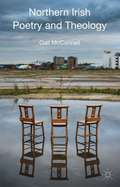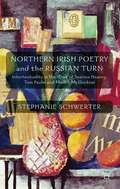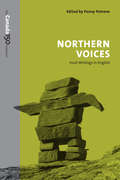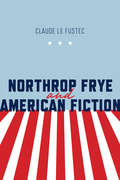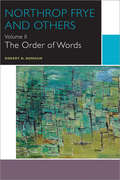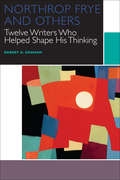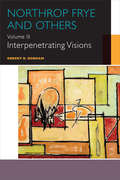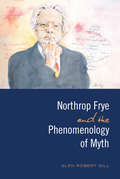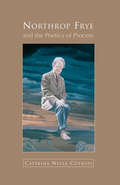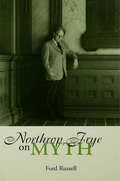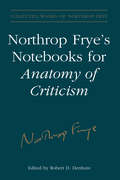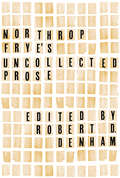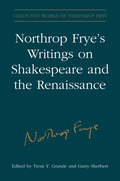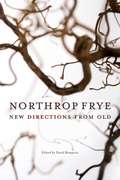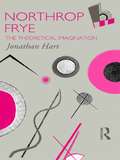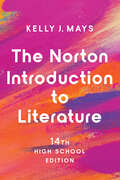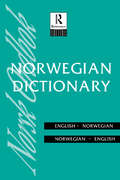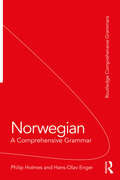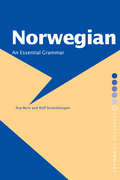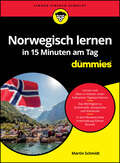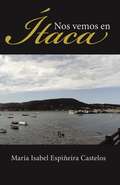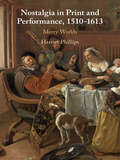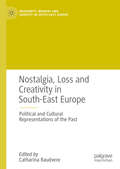- Table View
- List View
Northern Irish Poetry and Theology
by Gail McconnellNorthern Irish Poetry and Theology argues that theology shapes subjectivity, language and poetic form, and provides original studies of three internationally acclaimed poets: Seamus Heaney, Michael Longley and Derek Mahon.
Northern Irish Poetry and the Russian Turn
by Stephanie SchwerterSeamus Heaney, Tom Paulin and Medbh McGuckian are the three most influential poets from Northern Ireland who have composed poems with a link to the Tsarist Empire and the Soviet Union. Through their references to Russia the three poets achieve a geographical and mental detachment allowing them to turn a fresh eye on the Northern Irish situation.
Northern Voices: Inuit Writing in English
by Penny PetroneInuit of northern Canada have a rich oral tradition in their ancient languages and a more recent tradition of written English. Penny Petrone traces the two paths that link the cultural past of arctic peoples with its expression in the present day. The book's first section includes traditional legends, myths, folk history told by native story-tellers, and poetry sung by Inuit composers. The second presents statements and observations by some of the first Inuit to come into contact with European newcomers, including official reports, interviews, letters, and diaries. Next are early poetry and prose in translation, much of it autobiographical. The final section includes contemporary Inuit writing, from essays and speeches to fiction, poetry, and other genres of imaginative literature. The editor has provided an introduction for each item and arranged the material chronologically to give historical perspective and continuity to the whole.
Northrop Frye On Shakespeare
by Northrop FryeCriticism and interpretation of Romeo and Juliet, A Midsummer Night's Dream, Richard III, Henry IV, Hamlet, King Lear, Antony and Cleopatra, Measure for Measure, The Winter's Tale, and The Tempest.
Northrop Frye and American Fiction
by Claude Le FustecNorthrop Frye and American Fiction challenges recent interpretations of American fiction as a secular pursuit that long ago abandoned religious faith and the idea of transcendent experiences. Inspired by recent philosophical thinking on post-secularism and by Northrop Frye's theorizing on the connections between the Bible and the development of Western literature, Claude Le Fustec presents insightful readings of the presence of transcendence and biblical imagination in canonical novels by American writers ranging from Nathaniel Hawthorne to Toni Morrison.Examining these novels through the lens of Frye's ambitious account of literature's transcendent, or kerygmatic power, Le Fustec argues that American fiction has always contained the seeds of a rejection of radical skepticism and a return to spiritual experience. Beyond an insightful analysis of Frye's ideas, Northrop Frye and American Fiction is powerful testimony of their continued interpretive potential.
Northrop Frye and Others: The Order of Words (Canadian Literature Collection)
by Robert D. DenhamThis book, based on extensive archival and historical work, identifies and brings to light additional and littlerecognized intellectual influences on Frye, and analyzes how they informed his thought. These are variously major thinkers, sets of texts, and intellectual traditions: the Mahayana Sutras, Machiavelli, Rabelais, Boehme, Hegel, Coleridge, Carlyle, Mill, Jane Ellen Harrison and Elizabeth Fraser. In each chapter, dedicated to Frye’s connection to a specific influence, Denham describes how Frye became acquainted with each, and how he interpreted and adapted certain ideas from them to help work out his own conceptual systems. Denham offers insights on Frye’s relationship with his historical and intellectual contexts, provides valuable additional context for understanding the work of one of the 20th century’s leading scholars of literature and culture. Includes over 20 photos, tables and figures, as well as a chapter on Frye’s personal relationship with Elizabeth Fraser.
Northrop Frye and Others: Twelve Writers Who Helped Shape His Thinking (Canadian Literature Collection)
by Robert D. DenhamEminent Northrop Frye scholar Robert D. Denham explores the connection between Frye and twelve writers who influenced his thinking but about whom he didn’t write anything expansive. Denham draws especially on Frye’s notebooks and other previously unpublished texts, now available in the Collected Works of Frye. Such varied thinkers as Aristotle, Lewis Carroll, Søren Kierkegaard, and Paul Tillich emerge as important figures in defining Frye’s cross-disciplinary interests. Eventually, the twelve “Others” of the title come to represent a space occupied by writers whose interests paralleled Frye’s and helped to establish his own critical universe.
Northrop Frye and Others: Volume III: Interpenetrating Visions (Canadian Literature Collection)
by Robert D. DenhamRobert D. Denham pursues his quest to uncover the links between Northrop Frye and writers and others who directly influenced his thinking but about whom he did not write an extensive commentary. The first chapter is about Frye’s reading of Patanjali, the founder of the philosophy of Hindu yoga, while the second, discusses cultural mythographer Giambattista Vico, literary history and poetic language. The focus of Frye’s criticism was the verbal arts, but he also had an abiding interest in both the visual arts and music; hence Frye’s admiration of J.S. Bach. The essay on Tolkien examines the tendency in literary history to return from irony to myth, as well as the role that Tolkien played in Frye’s fiction-writing fantasies. In subsequent chapters, Denham explores Frye’s preference for romance and his critique of realism, which run parallel to the views of Oscar Wilde, and their strong shared convictions about the centripetal thrust of art, and about criticism being as creative as literature. Frye’s appreciation for Whitehead’s concept of interpenetration in Science in the Modern World became a key feature of Frye’s speculations about the highest reaches of literature and religion. Frye is clearly indebted to Martin Buber, particularly his influential meditation I and Thou. Aristotle, an important influence upon Frye, was partially filtered through R.S. Crane and his The Languages of Criticism and the Structure of Poetry. Finally, the relationship between Frye and his Oxford tutor Edmund Blunden are explored, while the last is an essay on Frye and M.H. Abrams on how Frye’s critical project might be viewed developed in Abrams’s The Mirror and the Lamp. This book is published in English. - Robert D. Denham poursuit son examen d’écrivains et autres influences qui ont marqué l’éminent critique Northrop Frye, mais sur lesquels celui-ci n’avait pas consacré de réflexions très développées. Le premier chapitre porte sur la lecture que fait Frye de Patanjali, le fondateur de la philosophie du yoga hindou, et le deuxième, sur le mythographe culturel Giambattista Vico, l’histoire littéraire et le langage poétique. Frye s’intéressait aux arts visuels et à la musique et Denham approfondit l’influence de J.S. Bach sur Frye. Le chapitre sur Tolkien porte sur la tendance en histoire littéraire de passer de l’ironie au mythe, mais aussi sur l’ascendant de Tolkien sur la fiction fantaisiste de Frye. Dans les chapitres suivants, Denham explore la préférence de Frye pour le romantique et sa critique du réalisme, qui trouvent écho chez Oscar Wilde, de même que leur conviction, partagée, de l’importance de l’art, et de la critique comme étant aussi créative que la littérature. L’admiration de Frye pour le concept d’interpénétration présenté dans le Science in the Modern World de Whitehead est devenue un élément clé des réflexions de Frye sur la portée de la littérature et de la religion. Denham explore aussi le lien entre Frye et Martin Buber, dont la méditation I and Thou l’a beaucoup inspiré, et celui entre Frye et R.S. Crane, qui parle beaucoup d’Aristote dans son ouvrage The Languages of Criticism and the Structure of Poetry. Le chapitre 9 explore la relation entre Frye et son tuteur d’Oxford, Edmund Blunden, alors que le dernier chapitre porte sur Frye et M.H. Abrams, et notamment sur le projet critique de Frye compris à la lumière du cadre sur la théorie critique développé par Abrams dans The Mirror and the Lamp. Ce livre est publié en anglais.
Northrop Frye and the Phenomenology of Myth
by Glen Robert GillIn Northrop Frye and the Phenomenology of Myth, Glen Robert Gill compares Frye's theories about myth to those of three other major twentieth-century mythologists: C.G. Jung, Joseph Campbell, and Mircea Eliade. Gill explores the theories of these respective thinkers as they relate to Frye's discussions of the phenomenological nature of myth, as well as its religious, literary, and psychological significance.Gill substantiates Frye's work as both more radical and more tenable than that of his three contemporaries. Eliade's writings are shown to have a metaphysical basis that abrogates an understanding of myth as truly phenomenological, while Jung's theory of the collective unconscious emerges as similarly problematic. Likewise, Gill argues, Campbell's work, while incorporating some phenomenological progressions, settles on a questionable metaphysical foundation. Gill shows how, in contrast to these other mythologists, Frye's theory of myth - first articulated in Fearful Symmetry (1947) and culminating in Words with Power (1990) - is genuinely phenomenological.With excursions into fields such as literary theory, depth psychology, theology, and anthropology, Northrop Frye and the Phenomenology of Myth is essential to the understanding of Frye's important mythological work.
Northrop Frye and the Poetics of Process
by Nella CotrupiNella Cotrupi's "Northrop Frye and the Poetics of Process" sheds a new conceptual light on Frye, successfully bringing him back into the central ring of contemporary critical thought. Challenging the often dismissive view of Frye's work as closed and outdated, Dr. Cotrupi explores the implications of his proposition that the history of criticism may be seen as having two main approaches-literature as "product" and literature as "process." In focusing on Frye's exploration of the process tradition Cotrupi sheds light on the agenda that Frye established for himself, when he noted at the end of Anatomy of Criticism that the reconciliatory task of criticism was to "reforge the broken link between creation and knowledge, art and science, myth and concept."Dr. Cotrupi recontextualizes Frye's thought and shows us how Frye continues to be, not only relevant, but central to a number of the key concerns in the contemporary critical scene. Re-examining Frye's place in the history of critical thought, Dr. Cotrupi builds upon Frye's original vision of the "process" tradition and suggests further directions this exploration may take. Among the current areas of critical engagement which Cotrupi examines are relativism, possible world theory, and postmodernism--making this work of interest not only to Frye scholars, but also to those interested in the debates currently rocking the world of criticism, literature and culture.
Northrop Frye on Myth (Theorists of Myth)
by Ford RussellNortrop Frye differed from other theorists of myth in tracing all of the major literary genres--romance, comedy, satire, not just tragedy--to myth and ritual. This volume is the most thorough presentation of his thinking on the subject.
Northrop Frye's Notebooks for Anatomy of Critcism
by Northrop Frye Robert D. DenhamNorthrop Frye's Anatomy of Criticism (1957) is widely regarded as a masterpiece of literary theory. The product of years of reading and reflection, the book's value extends far beyond its impact on criticism as a whole; ultimately, it must be viewed as a synoptic defense of liberal learning by one of the twentieth century's most distinguished critics. In this, the twenty-third volume of the Collected Works, editor Robert D. Denham presents the notebooks to the Anatomy, blue-prints, as it were, for Frye's comprehensive account of literary conventions. Composed from the late 1940s to 1956, the notebooks document the struggle Frye underwent to provide a structure for his work. This involved incorporating previously published essays and developing new material that would maintain the continuity of his argument. This fully annotated volume contains seventeen holograph notebooks, each illuminating some aspect of the grand structure that eventually emerged. Altogether, the notebooks offer an intimate picture of Frye's working process and a renewed appreciation for his magisterial accomplishment.
Northrop Frye's Student Essays, 1932-1938
by Northrop Frye Robert D. Denham'Frye was a person of uncommon gifts, and very little that came from his pen is without interest.' So writes Robert Denham in his introduction to this unique collection of twenty-two papers written by Northrop Frye during his student years. Made public only after Frye's death in 1991, all but one of the essays are published here for the first time.The majority of these papers were written for courses at Emmanuel College, the theology school of Victoria College at the University of Toronto. Essays such as 'The Concept of Sacrifice,' 'The Fertility Cults,' and 'The Jewish Background of the New Testament' reveal the links between Frye's early research in theology and the form and content of his later criticism. It is clear that even as a theology student Frye's first impulse was always that of the cultural critic. The papers on Calvin, Eliot, Chaucer, Wyndham Lewis, and on the forms of prose fiction show Frye as precociously witty, rigorous, and incisive - a gifted writer who clearly found his voice before his last undergraduate year.David Lodge wrote in the New Statesman: 'There are not many critics whose twenty-year-old book reviews one can read with pleasure and instruction, but Frye is an exception to most rules.' Northrop Frye's student essays provide pleasure and instruction through their comments on the Augustinian view of history, on beauty, truth, and goodness, on literary symbolism and tradition.
Northrop Frye's Uncollected Prose
by Robert D. DenhamNorthrop Frye's Uncollected Prose, which features twenty-one pieces in the form of notes, prefaces, reviews, and talks, is the latest addition to the impressive body of writing by and about Frye. Among the highlights of the collection are Frye's "Notes on Romance," written in preparation for the lectures that eventually became The Secular Scripture; a newly discovered early notebook, parts of which may date from his second year as an undergraduate at Victoria College; and a pair of previously unavailable interviews. Expertly introduced by Robert D. Denham, one of the leading editors of Frye's papers, Northrop Frye's Uncollected Prose offers valuable insight into Frye's early life, his research methodology, and thought process, and is further proof of the remarkable depth and range of his work.
Northrop Frye's Writings on Shakespeare and the Renaissance (Collected Works of Northrop Frye #28)
by Northrop Frye Troni Y. Grande Garry SherbertThis collection of Northrop Frye's writings on Shakespeare and the Renaissance spans forty years of his career as a university teacher, public critic, and major theorist of literature and its cultural functions. Extensive annotations and an in-depth critical introduction demonstrate Frye's wide-ranging knowledge of Renaissance culture, the pivotal place of the Renaissance in his oeuvre, his impact on Renaissance criticism and on the Stratford Festival, and his continuing importance as a literary theorist.This volume brings together Frye's extensive writings on Shakespeare and other Renaissance writers (excluding Milton, who is featured in other volumes), and includes major articles, introductions, public lectures, and four previously published books on Shakespeare. Frye's insightful analyses offer not just a formidable knowledge of Renaissance culture but also a transformative experience, moving the reader imaginatively towards an experience of created reality.
Northrop Frye: New Directions from Old (Reappraisals: Canadian Writers)
by David RamptonMore than fifty years after the publication of Anatomy of Criticism, Northrop Frye remains one of Canada's most influential intellectuals. This reappraisal reasserts the relevance of his work to the study of literature and illuminates its fruitful intersection with a variety of other fields, including film, cultural studies, linguistics, and feminism. Many of the contributors draw upon the early essays, correspondence, and diaries recently published as part of the Collected Works of Northrop Frye series, in order to explore the development of his extraordinary intellectual range and the implications of his imaginative syntheses. They refute postmodernist arguments that Frye's literary criticism is obsolete and propose his wide-ranging and non-linear ways of thinking as a model for twenty-first century readers searching for innovative ways of understanding literature and its relevance to contiguous disciplines. The volume provides an in-depth examination of Frye's work on a range of literary questions, periods, and genres, as well as a consideration of his contributions to literary theory, philosophy, and theology. The portrait that emerges is that of a writer who still has much to offer those interested in literature and the ways it represents and transforms our world. The book's overall argument is that Frye's case for the centrality of the imagination has never been more important where understanding history, reconciling science and culture, or reconceptualizing social change is concerned.
Northrop Frye: The Theoretical Imagination (Critics of the Twentieth Century)
by Jonathan HartFirst published in 1994. Routledge is an imprint of Taylor & Francis, an informa company.
Norton Introduction to Literature (Fourteenth High School Edition)
by Kelly J. MaysThe most vibrant and flexible package for the AP® Literature course The Fourteenth High School Edition of The Norton Introduction to Literature offers an exciting mix of contemporary and classic stories, poems, and plays that instructors love to teach. Organized by genre and theme, the book provides a flexible approach as well as tools that help foster close-reading skills and develop writing skills. An accompanying guide for students, The Norton Guide to AP® Literature: Writing & Skills, unpacks and demystifies the skills central to the course. The new edition of the anthology, the AP® guide, and the online tools that accompany the package, including adaptive InQuizitive learning modules, provide AP® Literature students and teachers with the most powerful instruction and support for the course. AP® is a trademark registered by the College Board, which is not affiliated with, and does not endorse, this product/site. This purchase offers access to the digital ebook only.
Norwegian Dictionary: Norwegian-English, English-Norwegian (Routledge Bilingual Dictionaries)
by Forlang A.S. CappelensThis 2-way Dictionary is ideal for both linguists and the serious learner and user of Norwegian. Translations are supported by examples and entries are supported by an invaluable section covering aspects of Norwegian pronunciation and grammar.
Norwegian: A Study In Inflectional Morphology (Routledge Comprehensive Grammars)
by Philip Holmes Hans-Olav EngerNorwegian: A Comprehensive Grammar is a complete reference guide to modern Norwegian (the Bokmål standard). The Grammar is an essential source for the serious student of Norwegian, and for students of comparative linguistics. It is ideal for use in colleges, universities and adult classes of all types. The volume is organised to promote a thorough understanding of Norwegian grammar. It presents the complexities of Norwegian in a concise and readable form. Explanations are full, clear and free of jargon. Throughout, the emphasis is on Norwegian as used by present-day native speakers. An extensive index, numbered paragraphs, cross-references and summary charts provide readers with easy access to the information they require.
Norwegian: An Essential Grammar (Routledge Essential Grammars)
by Rolf Strandskogen Ase-Berit StrandskogenNorwegian: An Essential Grammar is a reference guide to the most important aspects of contemporary Norwegian as used by native speakers. The Grammar presents a fresh and accessible description of the language. Explanations are clear, free from jargon and often accompanied by exercises. The book gives a simple, step-by-step presentation of the grammatical systems of Norwegian and demonstrates and explains usages which have proved difficult for those learning the language in the past. It is clearly laid-out for easy reference making it accessible for those at a beginner/intermediate level. This is the ideal reference source for all learners, whether studying independently or in a class.
Norwegisch lernen in 15 Minuten am Tag für Dummies (Für Dummies)
by Martin SchmidtNur ein Viertelstündchen Norwegisch am Tag Sie wollen Norwegisch lernen, aber der Gedanke, stundenlang Vokabeln und Grammatik zu pauken, schreckt Sie ab? Dann ist dieses Buch genau das Richtige für Sie! In kurzen, auf 15 Minuten pro Tag begrenzten Lektionen bringt es Ihnen auf unterhaltsame Weise die norwegische Sprache näher. So erfahren Sie im Handumdrehen alles Wichtige über Grammatik, Aussprache und übliche Redewendungen. Durch regelmäßige Wiederholungsfragen können Sie Ihr Wissen testen und mithilfe des zum Download verfügbaren Audiomaterials auch die Aussprache üben. Nach nur drei Monaten beherrschen Sie die Grundlagen spielend. Sie erfahren Wie Sie in jeder Situation die richtigen Worte finden Mit welchen Redewendungen Sie brillieren Welche Wörter Sie nicht verwechseln sollten Wie Sie das Norwegische richtig aussprechen
Nos vemos en Ítaca
by María Isabel Espiñeira Castelos«Las cosas no siempre son lo que parecen y en ocasiones saber demasiado no hace que la vida sea mejor.» <P><P> Amanda se queda a la vez sin novio y sin trabajo y decide ir a un pueblo perdido en busca de la herencia de su tía Irene, de la que sabe muy poco. Unas cartas antiguas le mostrarán quien fue de verdad su tía a la vez que cambiarán su propia vida de manera inesperada.
Nostalgia in Print and Performance, 1510–1613: Merry Worlds
by Harriet PhillipsFor many people in early modern England the Reformation turned the past into another country: the 'merry world'. Nostalgia for this imaginary time, both widespread and widely contested, was commodified by a burgeoning entertainment industry. This book offers a new perspective on the making of 'Merry England', arguing that it was driven both by the desires of audiences and the marketing strategies of writers, publishers and playing companies. Nostalgia in Print and Performance juxtaposes plays with ballads and pamphlets, just as they were experienced by their first consumers. It argues that these commercial fictions played a central role in promoting and shaping nostalgia. At the same time, the fantasy of the merry world offered a powerfully affective language for conceptualising longing. For playwrights like Shakespeare and others writing for the commercial stage, it became a way to think through the dynamics of audience desire and the aesthetics of repetition.
Nostalgia, Loss and Creativity in South-East Europe: Political and Cultural Representations of the Past (Modernity, Memory and Identity in South-East Europe)
by Catharina RaudvereWhere nostalgia was once dismissed a wistful dream of a never-never land, the academic focus has shifted to how pieces of the past are assembled as the elements in alternative political thinking as well as in artistic expression. The creative use of the past points to the complexities of the conceptualization of nostalgia, while entering areas where the humanities meet the art world and commerce. This collection of essays shows how this bond is politically and socially visible on different levels, from states to local communities, along with creative developments in art, literature and religious practice. Bringing together scholars from a range of disciplines, the book offers analyses from diverse theoretical perspectives, united by an interest in the political and cultural representations of the past in South-East Europe from a long-term perspective. By emphasising how the relationship between loss and creative inspiration are intertwined in cultural production and history writing, these essays cover themes across South-East Europe and provide an insight into how specific agents – intellectuals, politicians, artists – have represented the past and have looked towards the future.
